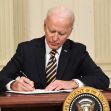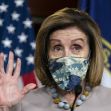President Biden plans to make good on his campaign promise of giving Americans pandemic relief through another round of stimulus checks.
Last Friday, the House gave the green light on a budget blueprint comprised of $1.9 trillion in pandemic relief, and over the weekend, the bill was moved through the Senate. Speaker of the House Nancy Pelosi shared in a letter to Democrats, “Our work to crush the coronavirus and deliver relief to the American people is urgent and of the highest priority.” Democrats plan to continue drafting out the details of the stimulus package in the coming week.
The last stimulus check which delivered direct payments of $600 to qualifying Americans will be more than doubled under Biden's stimulus package plan. President Biden explains, “I know some in Congress think we’ve already done enough to deal with the crisis in the country. That’s not what I see. I see enormous pain in this country. A lot of folks out of work. A lot of folks going hungry.”
The most recent job earnings report cited only 49,000 jobs being added to the economy in January, with only 6,000 added in the private sector. President Biden used the weak jobs report to reiterate the importance of an additional stimulus package.
What Will Biden's Stimulus Package Include?
In an effort to stimulate the economy, Biden is intent on keeping his promise of $1,400 in direct payments to qualifying Americans.
Unlike the first direct payment that excluded spouses of individuals who were undocumented from receiving payments, Biden's direct payments will go to all qualifying adults. Adult dependents will also be eligible for a direct payment.
There may be some difference in who can qualify for direct payment in this third round of stimulus aid as compared to the first and second rounds. Scattered reports indicate individuals who qualify for the $1,400 direct payments must make no more than $50,000 annually. Married households must not make more than $100,000 annually. It is not clear how or if phasing out the sum of the direct payments will work.
Additionally, the Biden administration will continue to focus on providing support for those who are unemployed. The previous $300 weekly unemployment benefit will be increased to $400 a week. Unemployment benefits will also cover those who are self-employed or are independent contractors or gig workers.
Individuals facing eviction can look forward to additional support in the new stimulus package as well. The administration hopes to allocate $25 billion in rental assistance. This funding will allow tenants to pay their rent but will also keep landlords from missing out on payments during the eviction moratorium. The previous eviction moratorium which was set to expire at the end of January will also be extended until the end of September. $5 billion will also be allocated to help renters cover utility costs.
Those who are struggling with food insecurities can look forward to an extension of the 15% increase in food stamp benefit. This increase will extend through September as well. Roughly $4 billion will be allocated to addressing food insecurities during the pandemic.
Small businesses can look forward to additional relief through the $15 billion allocated for creating a new grant program that small businesses can apply for. This new grant program is separate from the current Paycheck Protection Program.
Additional state funding will increase by $350 billion. This state funding will encompass everything from providing additional funding to K-12 schools as colleges and universities. Funding for vaccine rollouts and an increase in testing sites will also be covered under this funding.
Though the state funding will support vaccine distribution, Biden is calling for a national vaccination program for which $20 billion will be set aside. This vaccination program is aimed at educating, providing support, and increasing the rollout of both vaccinations and testing. The money will also be used to hire additional public health workers in order to meet the demands of testing and vaccine distribution.
As Democrats continue to push for the third round of stimulus, Republicans have pushed back with objections on some aspects of Biden’s efforts. Biden's attempt at establishing a $15 an hour federal minimum wage has been met with resistance. A proposal by Republican Iowa senator Joni Ernst to block the increase of the federal minimum wage during the pandemic was granted by the Senate. In an effort to negotiate, Democrats did not push back against senator Ernst’s proposal.
Mixed Response to Third Stimulus Package
While the proposed stimulus relief package offers solutions to address the struggles many Americans are facing because of the pandemic, there is still some mixed opinion on whether or not an additional stimulus package, particularly the direct payments, will help boost the economy or further push the divide between low-income and middle-class families. According to the non-partisan Opportunity Insights, a research institute at Harvard University, data suggests that middle-income families saved their stimulus payments instead of injecting them into the economy. According to their research, households making $78,000 or more will spend only about $105 of their stimulus check.
Data such as this has caught the eye of lawmakers, with some Democrats agreeing that a more targeted delivery of stimulus checks may be a more beneficial approach. West Virginia Democratic senator Joe Manchin has shown his support for delivering checks to only those who need them instead of every American.
Overall, the American public has shown its support for a third round of stimulus checks. A Quinnipiac poll shows that nearly 80% of the American public is in favor of $1,400 stimulus checks. However, only 68% support the $1.9 trillion stimulus relief packaged being pushed by the Biden administration.
As Democratic lawmakers continue to drum up the details of the new stimulus package, they hope to have a finalized version by the end of February.






